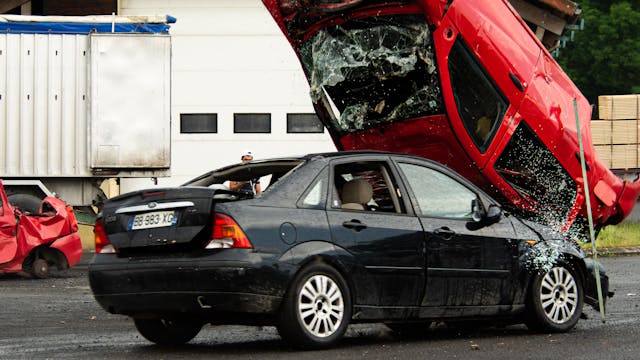Experiencing a car accident can be a terrifying and chaotic event, leaving behind more than just visible cuts and bruises. While we often think of broken bones and whiplash, the reality is that the aftermath can include lasting, invisible injuries as well.
People who have survived accidents might experience persistent pain, worry, or suffer from Post Traumatic Stress Disorder. In order to accurately measure the total influence of an accident, it is necessary to peek under the skin for the grief that the affected people are harboring.
The Physical Toll: More Than Just Whiplash
Whiplash is one of the most common car accident injuries, caused when the head and neck are suddenly forced backward and forward. A study of mild whiplash injuries (Quebec Grades 1 and 2) found that five years after a minor crash, about 40.7% of whiplash victims reported persistent pain, versus 22.2% of non-whiplash crash victims.
Whiplash symptoms can be a combination of stiffness, headaches, and dizziness, and most people recover in a few weeks while some become to have chronic pain. However, the thing that whiplash is a condition only one aspect of the whole physical puzzle. The most common types of injuries, which happen together, are:
- Fractures and broken bones: Sometimes, car crashes lead to broken arms, ribs, or legs that not only hurt but also need a long treatment.
- Soft tissue injuries: The pain of muscle strains, ligament damage, and bruising that people expect to disappear may last much longer than the healing time.
- Spinal cord trauma: Injury of the back that leads to continuous pain, limited movement, or even loss of control over the body.
- Traumatic brain injuries (TBIs): The condition of concussions and more severe brain injuries that cause memory, focus, and behavior to get worse.
Minor or even less severe injuries that can later become chronic and, therefore, a person’s ability to work, take care of the family, or just be happy with everyday life will be affected.
The Psychological Impact
While physical injuries are easier to diagnose, the emotional aftermath of an accident often goes unnoticed. Survivors may replay the crash in their minds, avoid driving altogether, or experience overwhelming fear in situations that remind them of the event. In fact, a study of over 6,800 road traffic accident survivors found PTSD affects about 22.25% of victims. Some common psychological effects include:
- Depression: After the disaster, the individual might progressively become sad, lose hope, and not get pleasure from what was nice and enjoyable.
- Anxiety disorders: The emergency survivors might suffer from a state of alertness all the time with an apprehension of another crash happening.
The Effects on Daily Life
The shock of a car crash that is unexpected is not going to vanish right away with the removal of the vehicles. Those that got hurt in an accident and whose lives, both at home and work, have been altered by the incident will probably go through problems with money, relationships, and with losing their freedom.
- Financial strain: Health costs, rehabilitation, and loss of income can become a source of mounting pressure.
- Relationship difficulties: Change of moods and feeling of anxiety that occur in the affected may result in weakening of relationships with families and friends.
- Loss of independence: On top of that, chronic injuries may restrict mobility, therefore, the affected will have to rely on others for help in doing basic tasks.
The ripple effect on the victims can make the entire recovery process seem too much to handle. It is very crucial to be able to identify both the visible and the invisible consequences of accidents for a proper recovery plan to be put in place.
The Importance of Medical and Legal Support
If the injured people are confronted with minor damages, it still remains very important that they seek prompt medical attention. There are a number of health disorders, for example concussions or internal bleeding, in which symptoms may not be present immediately but unavoidably they will become very dangerous if left untreated.
Mental healthcare is as important as the physical one and services, such as counseling or therapy, that allow learning of coping skills and receiving constant support for emotional trauma can be of great help. Healthcare is only a part of the victim’s installation journey; they often require unwavering solidarity from the legal side.
Insurance companies may try to minimize payouts or ignore the full extent of psychological damage. Working with an experienced Boca Raton car accident lawyer ensures that victims receive fair compensation for both physical and emotional injuries. Skilled attorneys understand how to build cases that reflect the true scope of trauma, from medical costs to lost income and long-term suffering.
Endnote
There is an extent to which an automobile crash can influence a person’s life such that due to the incident, the individual may become physically and mentally impaired. Therefore, a combination of medical treatment and emotional care available to the affected persons is very essential in such a situation.
The majority of accident victims find it necessary to consult medical practitioners as well as lawyers in order to get well again. They should not let doctors and lawyers put their energy in rehabilitation only. With proper care, the victims will be able to get their health, independence, and serenity back after such a horrible experience.







